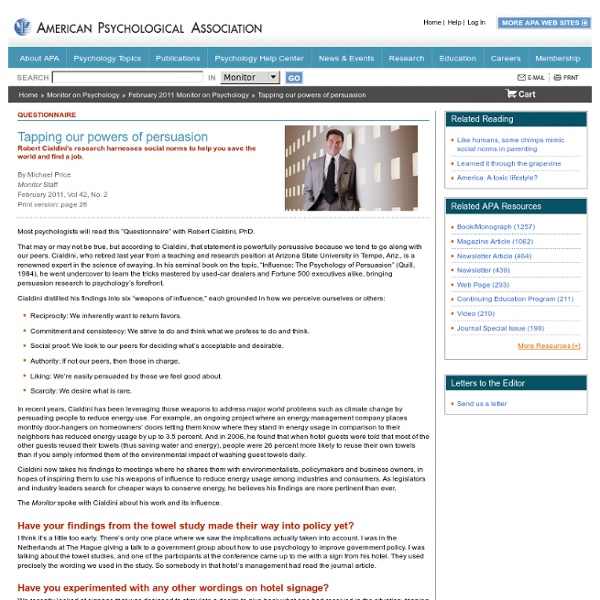How to Reduce Negativity
In one sense, the battle to be happy is a battle against negativity. Bad things happen all the time but how we internalize them, how we react to them, is what ultimately determines their final effect on us—and over that we have simultaneously more and less control than we realize. More, because assign the meaning of events, not the events themselves, even though it as if that meaning is somehow assigned for us. Yet less, because we can rarely simply when confronted with a negative life event that is is, in fact, actually positive. To do that, we have to find a way to actually believe it, and requires a process of continual self-reflection and attitude training; a program designed to strengthen our life force, so to speak. And a willingness to attack our negativity at its root.
The Ten Most Revealing Psych Experiments
Psychology is the study of the human mind and mental processes in relation to human behaviors - human nature. Due to its subject matter, psychology is not considered a 'hard' science, even though psychologists do experiment and publish their findings in respected journals. Some of the experiments psychologists have conducted over the years reveal things about the way we humans think and behave that we might not want to embrace, but which can at least help keep us humble. That's something. 1.
The Secret to Not Caring What People Think
Whether it is becoming plugged into our identity, quitting alcohol or even becoming more confident, our worry of what people think can really affect us. From the jobs we choose, to the people we date and the risks we take, we often limit our actions through fear of criticism or judgment from others. This is a serious issue, and a problem many people experience, therefore I’ve taken my personal experience and the advice of others to reveal the secrets to not caring what people think.
50 Life Secrets and Tips
Memorize something everyday.Not only will this leave your brain sharp and your memory functioning, you will also have a huge library of quotes to bust out at any moment. Poetry, sayings and philosophies are your best options.Constantly try to reduce your attachment to possessions.Those who are heavy-set with material desires will have a lot of trouble when their things are taken away from them or lost. Possessions do end up owning you, not the other way around. Become a person of minimal needs and you will be much more content.Develop an endless curiosity about this world.Become an explorer and view the world as your jungle. Stop and observe all of the little things as completely unique events.
Another DIY Photo Thing! (technical wording)
Here's another DIY post! This one covers the family photo that I put on a piece of wood that had a pretty shape to it. This is another mod podge project (the stuff is amazing...you can do anything and everything with it!) Materials: Block of wood (I got mine from Hobby Lobby for $2.99. There are a lot of different shapes that you can choose from)Spray paint of your choice.Photo of your choice.
Brain 'rejects negative thoughts'
9 October 2011Last updated at 18:14 By James Gallagher Health reporter, BBC News "Don't worry, everything will be fine," says the brain One reason optimists retain a positive outlook even in the face of evidence to the contrary has been discovered, say researchers. A study, published in Nature Neuroscience, suggests the brain is very good at processing good news about the future. However, in some people, anything negative is practically ignored - with them retaining a positive world view. The authors said optimism did have important health benefits.
10 Practical Uses For Psychological Research in Everyday Life
People love to give each other advice. The web is full to bursting with all types of pseudo-psychological advice about life. The problem is, how much of this is based on real scientific evidence?
Update the Relationship Learn-in. in Archives Learn-ins Forum
Repost ***Warning: These exercises are not to be used by anyone with a history of mental illness, severe trauma, or panic. Those challenges are best handled with a therapist. You are only permitted to use these exercises if you agree to absolve Steve Mensing, the webmasters, Emoclear.com and the web host of any responsibility for the application or misapplication of this process. With any emotional exercise there is the possibility of discomfort.
How to Stop Worrying - StumbleUpon
Undoing the Worrying Habit Once acquired, the habit of worrying seems hard to stop. We're raised to worry and aren't considered "grown up" until we perfect the art. Teenagers are told: "you'd better start worrying about your future". If your worries aren't at least as frequent as your bowel movements, you're seen as irresponsible, childish, aimless.
Oven "Fried" Pickles with Skinny Herb Buttermilk Ranch Dip
Cornmeal panko herb crusted dill pickles baked in the oven until golden and crisp. Have you ever had fried pickles? Fried pickles to a New Yorker is quite uncommon, alien actually!
Amy Gutman: How to Keep Going When You Think You Can't: 5 Tips for Tough Times
You probably know the feeling: Just when you most need to push ahead, whatever willpower you once possessed is nowhere to be found. As it turns out, this is no coincidence: Just as an overly ambitious workout regime can exhaust our bodies, researchers have found that too many demands can decimate our willpower. So what are we supposed to do?




See also pearl "Behavioural economics" here: by cassius Feb 3